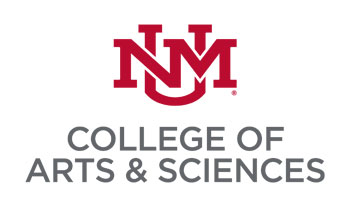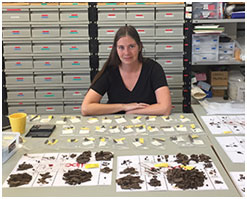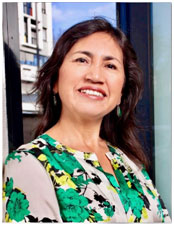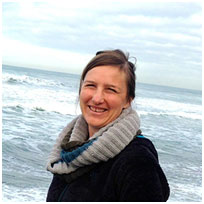New A&S Regents’ Lecturers Named

Posted: July 19, 2022
Interim Dean Arash Mafi is pleased to announce the three new Regents’ Lecturers in the College of Arts & Sciences. Regents’ Lecturer is a special title bestowed on selected tenured junior faculty members who, in the judgment of the Dean and on the advice of a faculty selection committee, merit recognition of their accomplishments as teachers, scholars and leaders both in university affairs and in their national/international professional communities.
 Emily Lena Jones is an associate professor in the Anthropology Department and a faculty affiliate of the Latin American and Iberian Institute at The University of New Mexico. Her research focuses on the connections between the human-animal relationship and environmental change across time and space, particularly during times of accelerated environmental change. She uses archaeological data—especially, but not exclusively, animal remains from archaeological sites—to understand how and why past environments changed, the socio-environmental legacies of these changes, and what the changes and their legacies reveal about why humans interact with the environment differently in different contexts. The Columbian Exchange and its effects in New Mexico, horses and human societies in the Americas following 1492 CE, and changes in human diets in Eurasia at the Pleistocene-Holocene transition are all subjects she studies.
Emily Lena Jones is an associate professor in the Anthropology Department and a faculty affiliate of the Latin American and Iberian Institute at The University of New Mexico. Her research focuses on the connections between the human-animal relationship and environmental change across time and space, particularly during times of accelerated environmental change. She uses archaeological data—especially, but not exclusively, animal remains from archaeological sites—to understand how and why past environments changed, the socio-environmental legacies of these changes, and what the changes and their legacies reveal about why humans interact with the environment differently in different contexts. The Columbian Exchange and its effects in New Mexico, horses and human societies in the Americas following 1492 CE, and changes in human diets in Eurasia at the Pleistocene-Holocene transition are all subjects she studies.
Jones’ work has been supported by several grants from the National Science Foundation and a Fulbright Award to Spain, among others. She is the author of In Search of the Broad Spectrum Revolution in Paleolithic Southwest Europe (Springer, 2016) and the co-editor of Questioning Rebound: People and Environmental Change in the Protohistoric and Early Historic Americas (University of Utah Press, November 2022). Her publications also include numerous articles, chapters, and reports, including "The community at the crossroads: artiodactyl exploitation and socio-environmental connectivity at Tijeras Pueblo (LA 581)" and "What is a refugium? Questions for the Middle–Upper Paleolithic transition in peninsular southern Europe."
 Rosa Vallejos-Yopán is an associate professor of Linguistics and a Presidential Teaching Fellow at The University of New Mexico. Her research focuses on Amazonia. Over the last twenty years, she has conducted several interconnected projects driven by a desire to find a balance between her academic work and her commitment to the communities with whom she works. She has conducted fieldwork on three distinct languages: Kukama (Tupían), Secoya (Tukanoan), and Amazonian Spanish. She pursues research in different areas of linguistics, including morphosyntax, language documentation, and language contact. She also collaborates with speech communities in their language revitalization efforts, such as orthography design, teacher training and the production of school materials.
Rosa Vallejos-Yopán is an associate professor of Linguistics and a Presidential Teaching Fellow at The University of New Mexico. Her research focuses on Amazonia. Over the last twenty years, she has conducted several interconnected projects driven by a desire to find a balance between her academic work and her commitment to the communities with whom she works. She has conducted fieldwork on three distinct languages: Kukama (Tupían), Secoya (Tukanoan), and Amazonian Spanish. She pursues research in different areas of linguistics, including morphosyntax, language documentation, and language contact. She also collaborates with speech communities in their language revitalization efforts, such as orthography design, teacher training and the production of school materials.
At UNM Dr. Vallejos-Yopán’s scholarship and teaching are intimately intertwined. She teaches courses dealing with linguistic structures and the role languages have in the lives of people as repositories for their identity, collective memory, and cultural history. Most of her graduate students work with indigenous peoples of the Americas.
Vallejos-Yopán is the author of A Grammar of Kukama-Kukamiria: A language from the Amazon (Brill 2016); the co-author of Diccionario kukama/castellano (Formabiap 2015); the co-editor of Nonverbal predication in Amazonian languages (John Benjamins 2018); and multiple journal articles and chapters. Her fieldwork has been funded by the National Science Foundation, the National Endowment for the Humanities, the Ford Foundation, the Hans Rausing Endangered Language Program, and the Endangered Language Fund. She has also received grants from UNM’s Research Allocations Committee, the Office of Vice President for Research, and the Latin American & Iberian Institute.
 Lindsay Lowe Worthington is an associate professor in the Department of Earth and Planetary Sciences and has been at The University of New Mexico since 2013. She is an Earth scientist who uses seismology to examine the structural evolution of the Earth’s crust and sedimentary processes at a variety of scales. She pursues questions about earthquakes on active tectonic plate boundaries, the interplay between stretching and volcanism during the breakup of continents, and how glaciers and related processes shape the seafloor in high-latitude regions. Her work involves field expeditions both on land and at sea and often incorporates extensive training opportunities for students and early career scientists.
Lindsay Lowe Worthington is an associate professor in the Department of Earth and Planetary Sciences and has been at The University of New Mexico since 2013. She is an Earth scientist who uses seismology to examine the structural evolution of the Earth’s crust and sedimentary processes at a variety of scales. She pursues questions about earthquakes on active tectonic plate boundaries, the interplay between stretching and volcanism during the breakup of continents, and how glaciers and related processes shape the seafloor in high-latitude regions. Her work involves field expeditions both on land and at sea and often incorporates extensive training opportunities for students and early career scientists.
Dr. Worthington has authored 33 peer-reviewed articles. As an educator, strives to make her classroom inclusive, inviting and engaging, utilizing multiple strategies for active learning and for developing trust and rapport with students. She is committed to improving justice, equity, diversity, and inclusion in the geosciences and STEM fields more broadly.
